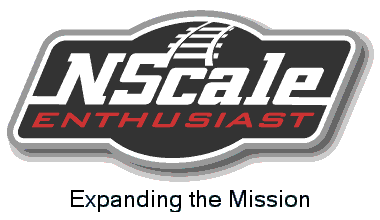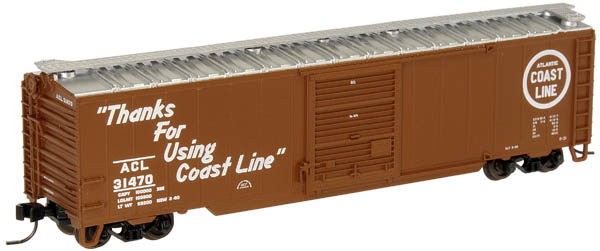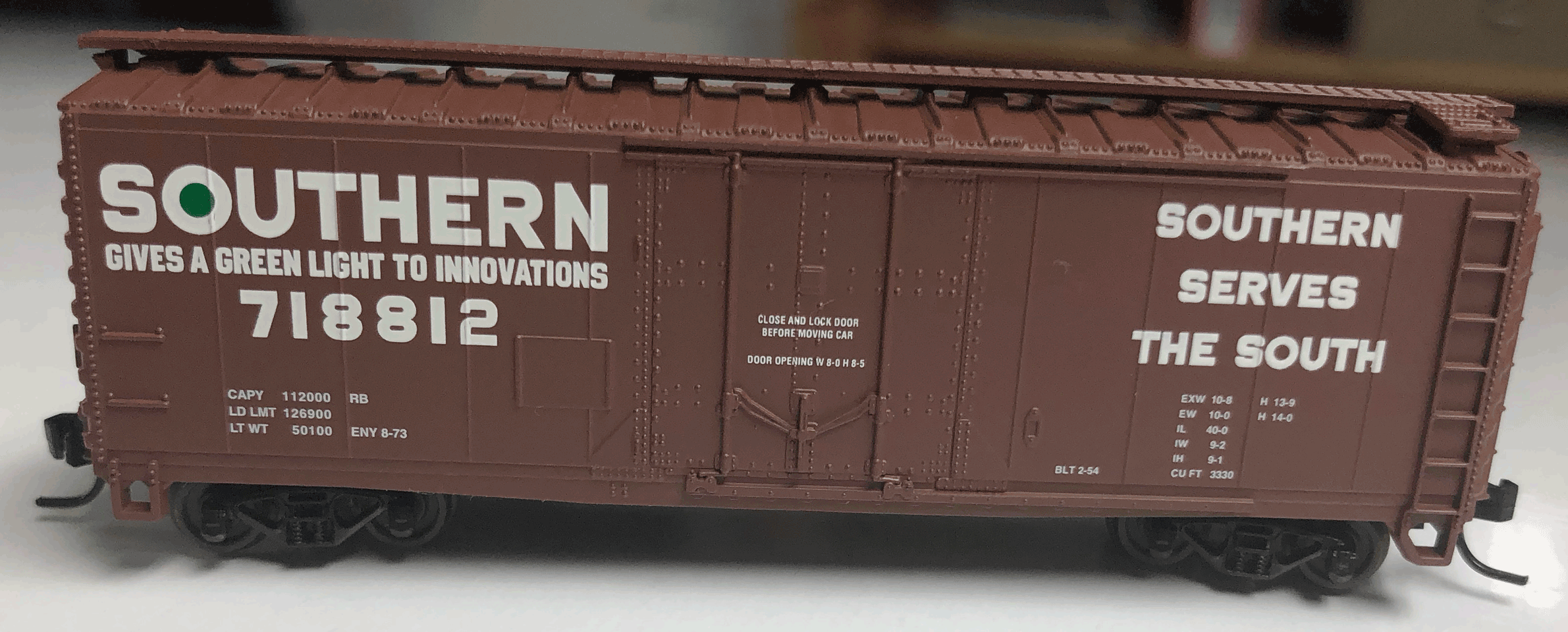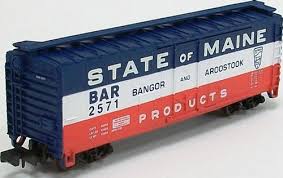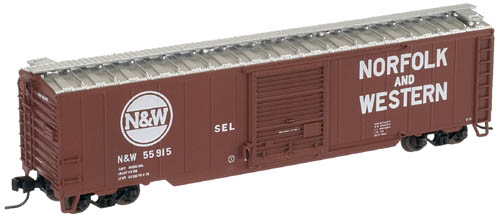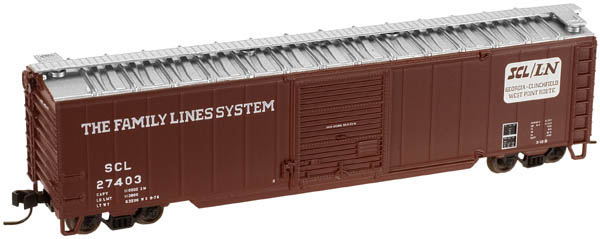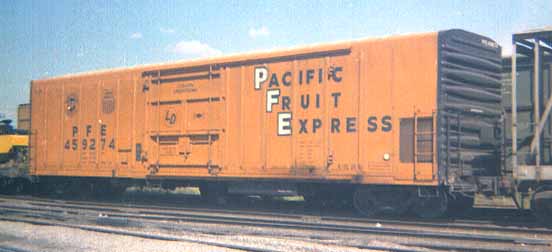Atlas - NSE ATL 19-01 - Boxcar, 50 Foot, Steel - N Scale Enthusiast - 51277
| Production Type | Special Run |
| Stock Number | NSE ATL 19-01 |
| Original Retail Price | $29.50 |
| Brand | Atlas |
| Manufacturer | Atlas |
| Body Style | Atlas Boxcar 50 Foot Single Door |
| Prototype Vehicle | Boxcar, 50 Foot, Steel (Details) |
| Road or Company Name | N Scale Enthusiast (Details) |
| Reporting Marks | ATSF |
| Road or Reporting Number | 51277 |
| Paint Color(s) | Brown with Silver Roof |
| Print Color(s) | White |
| Additional Markings/Slogan | Chicago Dogs Baseball Car |
| Coupler Type | MT Magne-Matic Knuckle |
| Coupler Mount | Truck-Mount |
| Wheel Type | Injection Molded Plastic |
| Wheel Profile | Standard |
| Announcement Date | 2019-07-01 |
| Release Date | 2019-07-01 |
| Item Category | Rolling Stock (Freight) |
| Model Type | Boxcar |
| Model Subtype | 50 Foot |
| Model Variety | Steel, PS-1 |
| Prototype Region | North America |
| Prototype Era | NA Era III: Transition (1939 - 1957) |
| Scale | 1/160 |
| Track Gauge | N standard |
Specific Item Information:
The boxcar is a memento of the inaugural NSE Friday Night Baseball Game in Rosemont, Illinois..
Model Information:
Atlas first announced this model in December of 2007 and delivered it in June of 2008. This model seemed to have been specifically developed as a budget model. It was introduced as part of the Trainman line from day 1. Most other Trainman models are older toolings that were 'downgraded' to Trainman due to age. Typically Trainman models have less detail and are thus easier to manufacture. When compared with other models being rolled out during that time, this this tooling was definitely a 2nd-class boxcar. We presume that it was specifically designed to be manufactured at a much lower price point than other cars such as the redesigned PS-1 boxcar also from Atlas which came out around the same time.
Prototype History:
While the 40-foot boxcar was a standard design, and it did come in different setups depending on the type of freight being transported, it was not large enough for efficient mass commodity transportation. The 50-foot boxcar made its first appearance in the 1930s and steadily grew in popularity over the years, which further improved redundancies by allowing for even more space within a given car. Today, the 50-footer remains the common boxcar size. After the second world war ended, and steel became once again readily available, steel became the go-to choice for construction of boxcars. Pullman Standard and ACF were some of the most prolific builders of these cars.
These cars came in many variations. For instance, double-doors became practical for large/wide loads, end-doors useful for very large lading such as automobiles, and interior tie-down equipment was helpful in keeping sensitive products from being damaged in-transit. In 1954 the Santa Fe developed its "Shock Control" (and later "Super Shock Control") technology for new boxcars with upgraded suspension systems to further improve the ride-quality and reduce the chance of damaging freight.
In the 1960s, the flush, "plug" style sliding door was introduced as an option that provides a larger door to ease loading and unloading of certain commodities. The tight-fitting doors are better insulated and allow a car's interior to be maintained at a more even temperature.
These cars came in many variations. For instance, double-doors became practical for large/wide loads, end-doors useful for very large lading such as automobiles, and interior tie-down equipment was helpful in keeping sensitive products from being damaged in-transit. In 1954 the Santa Fe developed its "Shock Control" (and later "Super Shock Control") technology for new boxcars with upgraded suspension systems to further improve the ride-quality and reduce the chance of damaging freight.
In the 1960s, the flush, "plug" style sliding door was introduced as an option that provides a larger door to ease loading and unloading of certain commodities. The tight-fitting doors are better insulated and allow a car's interior to be maintained at a more even temperature.
Road Name History:
The N Scale Enthusiast Society (previously known as The N Scale Collector until 2011) was established by Wick Brandon, as a sole proprietorship and was a stand alone company until Wick passed away in 2000. The company has been owned by Micro Trains Line since then.
Wick was the founder of TexNRails and he established NSE right after he sold the pioneering N Scale retailer to the Herz family, and the store moved to Florida. Wick and Lea moved their family from Texas to Bakersfield California, and the entire operation was run from his home in Bakersfield. George Johnsen, the current Chairman, came on board as Associate Editor starting with the third issue of the magazine, and the growth of the organization hasn’t stopped. Wick and George did the first convention in Medford in 1993, and added staff and advisors as the organization grew. Wick held the first auction for the NSE in 1995.
The NSE mission statement reads: “This organization is dedicated to the preservation of the history of N Scale Model Railroading, and the railroads they represent.”
They do:
- Special Run Cars
- Regular Auctions of "collectable" Cars
- Annual Conventions
- Bi-Monthly Magazine
Wick was the founder of TexNRails and he established NSE right after he sold the pioneering N Scale retailer to the Herz family, and the store moved to Florida. Wick and Lea moved their family from Texas to Bakersfield California, and the entire operation was run from his home in Bakersfield. George Johnsen, the current Chairman, came on board as Associate Editor starting with the third issue of the magazine, and the growth of the organization hasn’t stopped. Wick and George did the first convention in Medford in 1993, and added staff and advisors as the organization grew. Wick held the first auction for the NSE in 1995.
The NSE mission statement reads: “This organization is dedicated to the preservation of the history of N Scale Model Railroading, and the railroads they represent.”
They do:
- Special Run Cars
- Regular Auctions of "collectable" Cars
- Annual Conventions
- Bi-Monthly Magazine
Brand/Importer Information:
In 1924 Stephan Schaffan, Sr. founded the Atlas Tool Company in Newark, New Jersey. In 1933 his son, Stephan Schaffan, Jr., came to work for his father at the age of sixteen. Steve Jr. built model airplanes as a hobby and frequented a local hobby shop. Being an enterprising young man, he would often ask the owner if there was anything he could do to earn some extra spending money. Tired of listening to his requests, the hobby-store owner threw some model railroad track parts his way and said, "Here, see if you can improve on this".
In those days, railroad modelers had to assemble and build everything from scratch. Steve Jr. created a "switch kit" which sold so well, that the entire family worked on them in the basement at night, while doing business as usual in the machine shop during the day.
Subsequently, Steve Jr. engineered the stapling of rail to fiber track, along with inventing the first practical rail joiner and pre-assembled turnouts and flexible track. All of these products, and more, helped to popularize model railroading and assisted in the creation of a mass-market hobby. The budding entrepreneur quickly outgrew the limitations of a basement and small garage operation. Realizing they could actually make a living selling track and related products, Steve and his father had the first factory built in Hillside, New Jersey at 413 Florence Avenue in 1947. On September 30, 1949, the Atlas Tool Company was officially incorporated as a New Jersey company.
In 1985, Steve was honored posthumously for his inventions by the Model Railroad Industry Association and was inducted into the Model Railroad Industry Hall of Fame in Baltimore, Maryland. In addition, Steve was nominated and entered into the National Model Railroad Association Pioneers of Model Railroading in 1995.
In the early 1990s, the Atlas Tool Company changed its name to Atlas Model Railroad Company, Inc.
In those days, railroad modelers had to assemble and build everything from scratch. Steve Jr. created a "switch kit" which sold so well, that the entire family worked on them in the basement at night, while doing business as usual in the machine shop during the day.
Subsequently, Steve Jr. engineered the stapling of rail to fiber track, along with inventing the first practical rail joiner and pre-assembled turnouts and flexible track. All of these products, and more, helped to popularize model railroading and assisted in the creation of a mass-market hobby. The budding entrepreneur quickly outgrew the limitations of a basement and small garage operation. Realizing they could actually make a living selling track and related products, Steve and his father had the first factory built in Hillside, New Jersey at 413 Florence Avenue in 1947. On September 30, 1949, the Atlas Tool Company was officially incorporated as a New Jersey company.
In 1985, Steve was honored posthumously for his inventions by the Model Railroad Industry Association and was inducted into the Model Railroad Industry Hall of Fame in Baltimore, Maryland. In addition, Steve was nominated and entered into the National Model Railroad Association Pioneers of Model Railroading in 1995.
In the early 1990s, the Atlas Tool Company changed its name to Atlas Model Railroad Company, Inc.
Item created by: CNW400
on 2019-07-12 12:53:46
Last edited by: gdm on 2020-07-24 07:29:22
If you see errors or missing data in this entry, please feel free to log in and edit it. Anyone with a Gmail account can log in instantly.
Last edited by: gdm on 2020-07-24 07:29:22
If you see errors or missing data in this entry, please feel free to log in and edit it. Anyone with a Gmail account can log in instantly.




